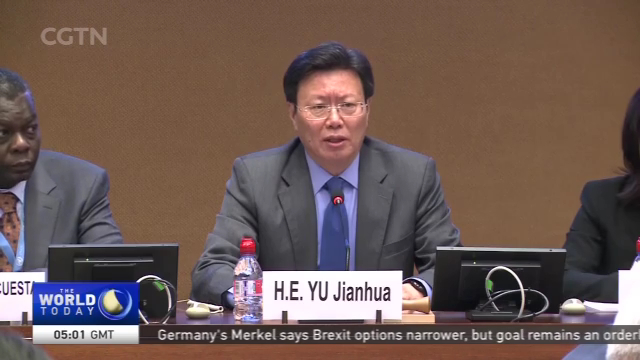
13:38, 14-Mar-2019
Progress in Xinjiang: International experts discuss China Human Rights Report
Updated
13:30, 17-Mar-2019
04:24

At the United Nations Human Rights Council meeting in Geneva, there are high-level discussions taking place this week about the Xinjiang Uygur Autonomous Region and Tibet Autonomous Region. Among those keeping a close eye on this subject is the China Society for Human Rights Studies. CGTN's Xi Jia is in Switzerland with more.
Here at the 40th session of the U.N. Human Rights Council, participants are talking about environmental protection, living standards, education as well as training and education centers in Xinjiang.
XI JIA GENEVA "The training and education centers in Xinjiang have always been described as 'concentration camps' by some of the foreign press. So, what exactly are these training centers for? And why are they drawing so much attention from the international community?"
Since the 1990s, many people have died in Xinjiang, the result of ethnic and religious extremism.
YU JIANHUA HEAD OF THE CHINESE MISSION TO UN AT GENEVA "Xinjiang has adopted a series of anti-terrorism and de-extremism measures, including the establishment of vocational skills education and training centers, to help a small number of people who are seduced by extremism, to prevent them from becoming perpetrators and victims of terrorism."
These centers teach students about the Chinese language and vocational skills. Last month, Vadim Pisarevich was invited to visit Xinjiang with seven other UN representatives. He thinks these places are more than vocational centers. They also provide critical psychological and social skills.
VADIM PISAREVICH BELARUSIAN DEPUTY PERMANENT REPRESENTATIVE TO UN "Critical thinking, reflection, ability to resist pressure, problem solving, which help them to be engaged to something negative, to respond to the challenges to their lives."
Nikita Zhukov also visited Xinjiang in February and what impressed him most is the opportunity the government offered to learn Chinese, which makes it possible to work in Xinjiang and other cities.
NIKITA ZHUKOV RUSSIAN DEPUTY PERMANENT REPRESENTATIVE TO UN "And this like I said is a social elevator which allows them to avail themselves of this opportunity which is given to them free of charge by the Chinese authorities."
We asked Zhukov why some foreign press would prefer to describe these training centers as concentration camps?
NIKITA ZHUKOV RUSSIAN DEPUTY PERMANENT REPRESENTATIVE TO UN "May be because it's successful. I though about it. I saw it a very success to integrate rural youth into modern society. There are of course people do not like Chinese to succeed in this, like I said, people who want to use human rights for political purposes."
Pisarevich told me he would never forget the smiles he saw on the faces of young people.
XI JIA: "The happy faces, can they just pretend to be happy?"
VADIM PISAREVICH BELARUSIAN DEPUTY PERMANENT REPRESENTATIVE TO UN "No, absolutely natural, you can not cheat in this way. Let me tell you, when I was in Belarus some delegation from UN wants to see the prison and I went with them, so I saw those faces, they were absolutely different faces from what I saw in Xinjiang."
Xi Jia, CGTN, Geneva.

SITEMAP
Copyright © 2018 CGTN. Beijing ICP prepared NO.16065310-3
Copyright © 2018 CGTN. Beijing ICP prepared NO.16065310-3